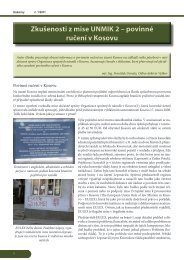TRADOC Pam 525-3-7-01 - TRADOC - U.S. Army
TRADOC Pam 525-3-7-01 - TRADOC - U.S. Army
TRADOC Pam 525-3-7-01 - TRADOC - U.S. Army
- No tags were found...
You also want an ePaper? Increase the reach of your titles
YUMPU automatically turns print PDFs into web optimized ePapers that Google loves.
<strong>TRADOC</strong> <strong>Pam</strong> <strong>525</strong>-3-7-<strong>01</strong>Members of the American military profession swear to support and defend adocument, the Constitution of the United States—not a leader, people,government or territory. That solemn oath ties military service directly to thegoverning document of the Nation. It instills a nobility of purpose within eachmember of the Armed Forces and should provide deep personal meaning to allwho serve. The profession holds common standards and a code of ethics derivedfrom common moral obligations undertaken in its members’ oaths of office.These unite members of all the services in their common purpose: defending theConstitution and protecting the Nation’s interests, at home and abroad against allthreats.Ultimately, the professional military ethic rooted in fundamental American Constitutionallaws distinguishes a member of the American profession of arms from irregulars, mercenaries,terrorists, or members of another armed force. Legitimacy in the eyes of the government andAmerican society is largely contingent on the application of the military ethic and the structure itgives the other attributes of the military profession, but this affords the profession considerablescope for autonomous self-regulation to ensure professional effectiveness.The <strong>Army</strong> exists to serve the American people, protect enduring national interests, and tosupport and defend the constitution. The professional military ethic is essential to this primarymission. Over time, adherence to the professional military ethic produces habits of ethical andprofessional behavior essential to the primary mission. Lived by all Soldiers, a strongprofessional military ethic and moral character are the foundation for the warrior spirit that mustpermeate the entire force today and in future full spectrum operations.1-7. Challenges to the Future SoldierJust as today, tomorrow’s warriors must perform their vital functions in the face of grievouswounds, injury, or death. Often in future conflicts avoiding harming the innocent or inflictingexcessive damage will assume critical importance to mission accomplishment. This can createcircumstances more complex and frustrating than the acceptance of the straightforward risk ofengaging an armed foe on the battlefield. The Soldier must prepare for transitions from intenseclose combat, to providing security or humanitarian assistance to hostile or indifferent others.The presence of embedded and ubiquitous media increases leaders’ challenges to remainsensitive to the wear and tear of even routine duties, and to remind Soldiers of the ethicalresponsibilities of their honorable calling as American Soldiers.Achieving technical competence and increasing cognitive abilities require better training andeducation. This training and advanced technical competence will create opportunities forSoldiers to opt out of continued service and join the civilian workforce. The <strong>Army</strong> mustrecognize and address this challenge if it is to retain these Soldiers in sufficient numbers andquality.Because <strong>Army</strong> ground forces are expensive and no longer can rely on an endless supply ofrecruits, there may be an insufficient number of Soldiers available for prolonged deployments.The pressures on family maintenance imposed by successive separations will become as familiar19



